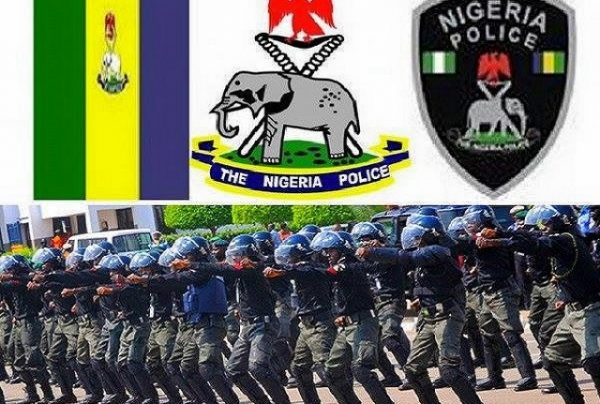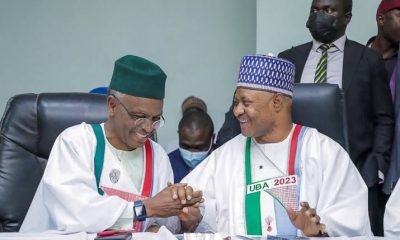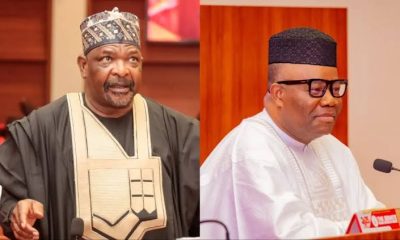Nigeria News
New Report Says Police Is Most Corrupt Institution In Nigeria (See Top 5)

Top 5 Most Corrupt Institutions In Nigeria
A new report based on a research by the Socio-Economic Rights and Accountability Project (SERAP) has established the Nigerian Police as the most corrupt institution in Nigeria.
The ranking was established after a survey was carried out across the six geopolitical zones in the country, including the Federal Capital Territory, Abuja.
According to the report, the Nigeria Police Force, power sector, education, judiciary and health ministry have been ranked the top five most corrupt institutions in Nigeria.
Kolawole Oluwadare, Deputy Director of SERAP, while speaking on the report, stated that in every encounter Nigerians have with policemen, there is 63 per cent chance that bribe would be demanded.
He said: “A bribe is paid in 54 per cent of interactions with the Police. In fact, there is a 63 per cent probability that an average Nigerian would be asked to pay a bribe each time he or she interacted with the Police. That is almost two out of three.
“The likelihood of bribery in the power sector stood at 49 per cent, while the chances of encountering bribery at the judiciary, education and health services stood at 27 per cent, 25 per cent and 20 per cent, respectively.”
The report also revealed the perception of Nigerians towards the corruption fight of President Muhammadu Buhari, with a total of 41 per cent of respondents believing that corruption would either increase or remain the same while one-third of the respondents said that there would be an increase in corruption level in the country.
In the power sector, 35 per cent of respondents believed that giving bribe to staff of the sector is the only way they can access good power supply.
“51 per cent of the individuals that paid bribes to the Police and 35 per cent to the power sector believed this was the only way to access the services sought from the institutions.”
The report read: “Several Nigerians have to pay a bribe to access police, judiciary, power, education and health services.
“Corruption is still a key concern in the country with 70 per cent of Nigerians describing the level of corruption as high and in the same measure, stating that corruption levels either increased or remained the same in the last five years.
“From the analysis of the anti-corruption legal and institutional framework in Nigeria, the following cross-cutting issues emerged: there is lack of political goodwill to consistently enforce the different anti-corruption laws; inadequate funding for the various anti-corruption agencies; weak public support and/or ownership of anti-corruption initiatives; poor clarity of roles between various anti-corruption agencies; and public perceptions of politicisation of corruption arrests and prosecutions.
“Bribery experiences were interrogated and recorded in the key sectors of education, health, the police, judiciary and power. Data analysis was conducted under five different and interrelated variables.
“The police were the most adversely ranked on this indicator. For every 100 police interactions reported by the respondents, there was a bribe paid in 54 interactions. The prevalence levels stood at 37 per cent in the power sector and 18 per cent in education,17.7 per cent in the judiciary and 14 per cent in the health sector.
“The ranking of the education sector and the judiciary was less adverse with 16 per cent perceiving bribery as the main avenue of accessing services in the institutions, and health services recording 13 per cent. The police and judiciary had the largest proportion of total bribes paid at 33 per cent and 31 per cent respectively.
“Bribes paid for education, power and health services accounted for 19 per cent, 10.9 and 5 per cent, respectively, of all bribes reported.
An analysis of the amount paid as bribe to these institutions also revealed the judiciary received the highest figure.
“The average amount of bribe paid by the respondents was highest among those who paid to the judiciary at about N108,000 (US$298).
“All the other institutions ranked lower on this variable with N12,253 and N11,566 reportedly paid to the police and education sectors, and ₦6,462 and ₦5,143 paid for health and power services, respectively.
“Perceptions on corruption trends in Nigeria show almost 70 per cent of the respondents perceived the current level of corruption as high compared to 15.5 per cent that felt it was low.
“70 per cent of the respondents said corruption levels either increased or remained the same in the last five years. Only a quarter of the respondents felt corruption reduced in this period.
“Additionally, about a quarter of the respondents (24.9 per cent) believed the current anti-corruption efforts are not comprehensive enough. The poor state of the economy was also seen as a driving factor to increased corruption at 17.2 per cent.
“Respondents identified poor coordination among the different state players as a key obstacle at 18.4 per cent. Lack of political will from the government and weak public support were ranked second at 12 per cent.
“Civic action against poor governance: 54.8 per cent of the respondents reported that they had not taken any action against poor governance. That more than half of the respondents were unwilling to initiate action is alarming and points to low confidence levels that appropriate measures would be taken even if the respondents took action.”
Speaking on a solution, the report suggested that an independent body should be set up to investigate corruption in the public sector and the need for the Inspector General of Police to always act swiftly when complaints are made by members of the public.
“The Federal Government should establish an independent commission of inquiry to conduct a transparent, comprehensive, and impartial investigation into systemic corruption within the Nigeria Police Force, judiciary, and the ministries of power, education and health.
“The Inspector General of Police should receive and investigate complaints of bribery and corruption against police officers filed by members of the public.
“The Chief Justice of Nigeria and the National Judicial Council should identify and review all outstanding cases of judicial corruption and refer such cases to appropriate anti-corruption agencies.”












